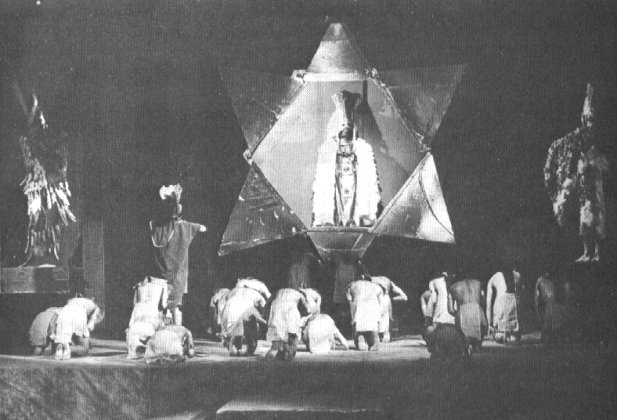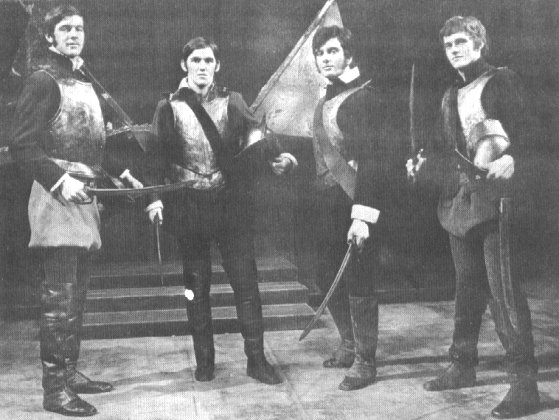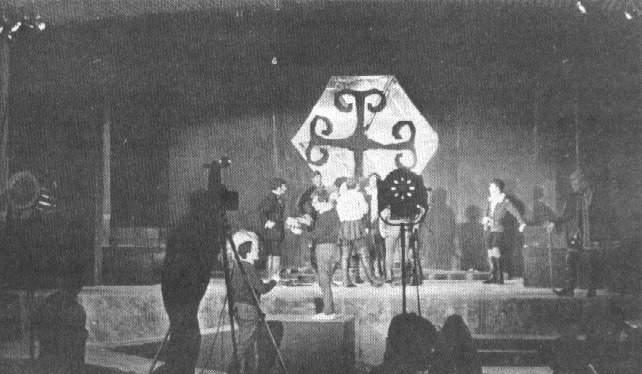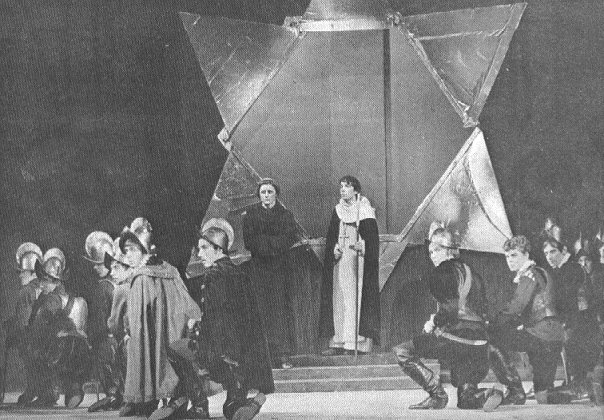|
......"THINGS TO MAKE YOU GROAN AND CRY OUT I'M LYING"...... |
|
Every year the school play is described in this magazine in terms of "the best yet".
|
......"THINGS TO MAKE YOU GROAN AND CRY OUT I'M LYING"...... |
|
 |
|
Staging the play presented great difficulties: training large numbers of boys to mime and chant; constructing a sun-burst which was to serve as a symbol and, moreover to 'act'. Also, the many facets of this new play called for on orchestra, comprised of several unusual percussion instruments; choreography, and exotic Inca costumes. Mr. Byrne spent several months gathering together on extraordinary collection of primitive instruments, which the boys in the orchestra took particular delight in playing, to produce the bizarre musical accompaniment. Mrs. Irons, mother of one of the cast, spent many tedious hours trying to turn clumsy school-boys into agile Indians--and succeeded admirably. Mothers spent long evenings sewing the many brilliant costumes which were to add dimensions to the play. |
|
"Royal Hunt of the Sun" combines the pagan splendour of the Inca civilisation with the barbaric, peasant-army of Spain, crusading for gold and the Cross. It tells of the clash between two powerful civilisations in the high Andes leading to futile corruption and destruction. More personally there is the confrontation of Francisco Pizzarro, the shrewd, but gullible commander and his captive, the proud and deified Atahuallpa. The atheistic, tormented Pizzarro finds faith through this noble, confident man/god. However, he has to submit to the pressures of his terrified army and his jealous church, which are howling for Atahuallpa's death. Pizzarro gives in after Atahuallpa's promise that the Sun's rays will pour life into his corpse. When this does not come about Pizzarro is a shattered man. |
|
 |
 |
|
After six months of rehearsal, and many sleepless nights for our producers, we presented "Royal Hunt of the Sun" on four nights in March. It received a marvellous reception from our audience; from the papers - the "Amateur Stage" had an article telling of our experiences in presenting the play. Also, we received many personal congratulations from people in the acting world. This made the play all the more rewarding. We had no scenes where actors appeared naked or issued forth from Row E, as in a well known current West End play! But with Indians scattered about the auditorium screaming and making bird-cries, the audience found themselves as bewildered as the Spaniards. The procession through the isles in which Atahuallpa was carried on a litter was the most colourful, awe inspiring scene in the play, and with the splendid crescendo from the orchestra, the stage filled with brown skin, white eyes and feathers. At this point one could make special mention of the Indians who had to put up with the dark brown body makeup for four days and thank the parents who had to deal with their sons' bedclothes the morning after the night before. |
|
|
It would he unfair to single out any members of the cast for after the initial painstaking rehearsals everyone settled dawn to the job they had to do and did it well. The parts played by Mr. Tufnell and Mr. Crawford can only be fully appreciated by the actors. All the audience sees of them is C.F.T. and G.C. on the bottom of the programme and perhaps a bow on the last night. For the actors, however, much more is seen. They both put more work than anyone into this play, supervising every aspect from conducting singing lessons to make-up. Their tireless efforts in giving the maximum help with interpretation of the play and their encouragement to us all was the major reason for the play's success. From the whole cast, we should like to say "Thank you very much indeed!" |
|
After the final curtain, we all thought we had the last of "The Royal Hunt". However, when Mr. Moss, husband of a member of staff, offered to film parts of the play for us, the college hall changed overnight from a theatre to a film studio. Irving Lerner's film version of the play has been released in London - but we got there first!
Photos: Father Aelred, SDS D.A. Bridgeman ~~~~~~~~~~ |
|
Dancers. |
|
 |